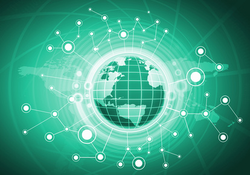Globalization
ComplianceTech®

We must give a strict definition of globalization. Globalization isn't simply the intensification of economic exchanges through the lowering of borders and the rapidity of trade, a phenomenon known since antiquity and of which the World Trade Organization (WTO) is today the guardian. Globalization aims at a radically new phenomenon, that of economic exchanges without any constraint of time or place, dealing with goods without corporality since it is information. This is the case for all personal data, all information and all finance (because financial instruments can be analyzed as information), which through technology flows out of space and in an instant. In what can be called "real virtuality", states and law do not know how to grasp normatively this new reality, because until now they had only apprehended palpable objects in spaces enclosed by their borders . Globalization, therefore, is a radical change the world, that has radically changed the game.
comments are disabled for this article